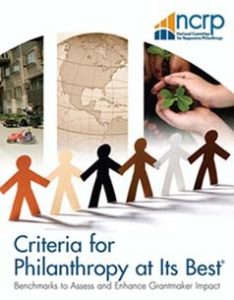
Criteria for Philanthropy at Its Best

The release of Criteria for Philanthropy at Its Best: Benchmarks to Assess and Enhance Grantmaker Impact helped focus conversation in the philanthropic sector about who benefits from foundation giving and which practices lead to impact and results.
Criteria is the first ever set of measurable guidelines that helps foundations and other institutional grant makers operate ethically and maximize the impact of their dollars.
Read: Criteria for Philanthrophy at its Best
Read: The Executive Summary
Read: In a nutshell
Read individual sections:
Preface
Chapter I: Values
Chapter II- Effectiveness
Chapter III- Ethics
Chapter IV- Commitment
Data Appendix
Discussion Questions
Philanthropy at its best serves the public good, not private interest.
The public has a legitimate interest in the use of philanthropic resources. Donors receive the privilege of tax deduction for charitable donations and tax exemption on investments. Foundations and other philanthropic institutions, therefore, have a responsibility to use their resources for the public good.
Philanthropy at its best employs grantmaking practices that most effectively help nonprofits achieve their missions.
Both grantmakers and nonprofit organizations are committed to improving society. Grantmakers, therefore, have a responsibility to listen to the needs, concerns and criticisms of their nonprofit partners and respond to what they hear, trusting that nonprofit leaders possess deep wisdom about what they need in order to most effectively achieve their missions and address critical societal needs.